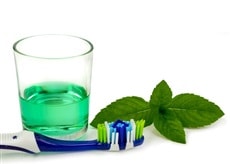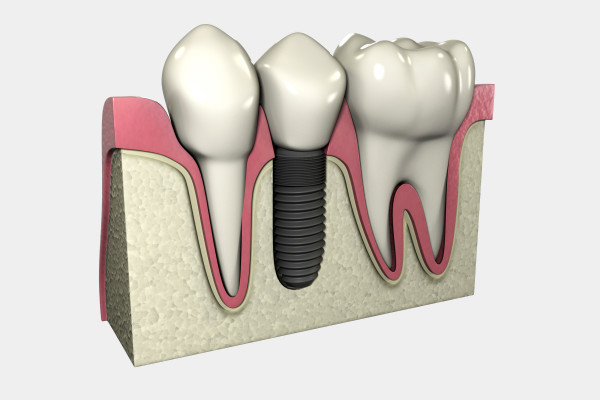 In our past blog, we talked about the causes of sensitive teeth. One way that you can combat sensitive teeth is by using dental products with fluoride. Although, that fluoride does a lot more than protect against sensitive teeth. Today, Dr. Keith Cooper is blogging from San Jose, CA to give you the facts on fluoride.
In our past blog, we talked about the causes of sensitive teeth. One way that you can combat sensitive teeth is by using dental products with fluoride. Although, that fluoride does a lot more than protect against sensitive teeth. Today, Dr. Keith Cooper is blogging from San Jose, CA to give you the facts on fluoride.
What is Fluoride?
Fluoride is one of the most common elements on earth, and it’s found organically in soil, water, food, and minerals like fluorapatite and fluorite. It’s also found in both salt and fresh bodies of water. Some fresh water sources actually have such high levels of fluoride that it’s toxic. Since fluoride is a chemical element, it can also be made in labs. Synthesized fluoride is usually added to drinking water, toothpaste, mouth rinses, and other chemical products.
Fluoride In Drinking Water
Oftentimes, fluoride is added to tap water to reduce tooth decay in the community. A study done in the early 1930s, found that communities with naturally fluoridated water had two-thirds less cavities than those in the area where water wasn’t fluoridated. Since then, a large number of studies have been conducted and found that communities with fluoride in their drinking water tend to have lower levels of tooth decay.
With that being said, a lot of the countries in Europe that don’t have fluoridated water haven’t found a higher rate of cavities. In Germany and Finland, tooth decay stayed the same and even got better once they stopped adding fluoride to the drinking water. This is indicative that perhaps the diet in Europe is less conducive to cavities, and therefore they don’t need the extra protection the fluoride offers.
How Fluoride Works
On a daily basis, teeth naturally lose minerals. Acids from food in combination with plaque and bacteria eats away the minerals of your teeth. This results in a dehardening of the teeth, making them even more susceptible to be penetrated by bacteria and tooth decay. Fluoride works by replacing minerals, resulting in remineralization. Fluoride doesn’t do all the work by itself though. Calcium and phosphate are also needed to replace minerals. While fluoride is effective at preventing cavities, it’s not as effective once the cavity has already taken hold.
Over half a century of scientific research has gone into figuring out if fluoride really helps against tooth decay, and the findings have been largely varying. A recent study has figured out that fluoride works by hardening your enamel and also keeps bacteria from adhering to your teeth. The experiment was performed on artificial teeth to ensure that they could be analyzed properly. They found that fluoride worked in congruence with brushing and flossing by making it easier to wash away the decay-causing bacteria. According to the National Health Service, fluoride proves a better environment for enamel to form and makes it more resistant to acids. It also works by limiting bacteria’s ability to make acids.
Who Benefits from Fluoride?
It’s recommended that everybody, adult and children alike, consume some level of fluoride. It’s recommended that children to receive the maximum amount of fluoride to protect their tiny permanent teeth, as they’re growing in. However, adults can also benefit from fluoride to keep tooth decay at bay.
People who are at higher risk for tooth decay should add fluoride to their daily dental routine. For instance, if you fit into any of the following categories:
- Poor Snacking Habits. If you snack on carbohydrates throughout the day, fluoride can help ward off the acids created by the excess snacking.
- Previously bad dental hygiene. If you’re rehabilitating your mouth from bad dental hygiene practices, fluoride can help remineralize your damaged teeth.
- Diets high in sugars/carbohydrates. If you drink a lot of sugary soft drinks or have a diet that’s particularly high in carbs, you could benefit from fluoride. Just like patients who snack often, people with sugary diets are more susceptible to tooth decay.
- Bridges, crowns, braces, and other restoration. Bridges, crowns, and braces make it easier for bacteria to lurk in nooks and crannies of your mouth. A fluoride rinse will strengthen your teeth and make it harder for bacteria to stick to you dental work.
- A History of Cavities. If you have a history of cavities or tooth decay, you’re probably already suffering from softened enamel. You can re-harden your enamel by adding fluoride into your routine.
- Sensitive teeth. Sensitive teeth are indicative of softened enamel and tooth decay. Try using fluoride to strengthen damaged areas of your mouth and make your teeth less sensitive.
- Bottled Water Drinkers. If you only drink bottled water, you’re not getting any fluoride from the tap. This means you could be lacking the essential amount of fluoride that you need to maintain proper oral health. Supplement your fluoride loss by using a fluoride rinse or paste.
How Much is Too Much?
A lot of opponents of fluoride claim that even trace amounts are toxic. However, there’s no substantial evidence backing this claim. Given the substantial evidence that fluoride is good for your dental health, a lot of companies add fluoride to everyday products like toothpaste, mouthwash, and even juices and sodas.
With all of the fluoride supplements available, it can be possible to consume too much fluoride. According to the Department of Health and Human Services, you should only have between .7- 1.2 milligrams per liter of fluoride. With that being said, the CDC recommends only using fluoride-containing water for healthy adults and limit the use of fluoride products for healthy children under 8.
Don’t Know If You Need Extra Fluoride?
If you’re unsure of whether you need fluoride or not, you should visit your dentist. Your dentist will tell you if you’re suffering from tooth decay, and if supplemental fluoride will benefit you. Fluoride in your dental routine might be the solution to your tooth decay dilemmas.




